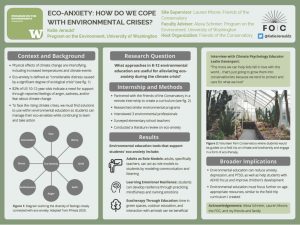Eco-Anxiety: How do we Cope with Climate Crises?
As the threat of climate change increases and awareness of its impact on mental health follows, eco-anxiety is rapidly becoming more prevalent. More people are experiencing eco-anxiety and additional solutions are needed, especially in environmental education where many people experience this form of anxiety which can be detrimental to people’s ability to take environmental action. The purpose of this study was to understand how environmental education can be used as a tool to support student’s mental health in relation to the climate crisis. I worked with a nonprofit called the Friends of the Conservatory to produce an environmental education curriculum by researching similar organizations, interviewing environmental program managers, and surveying elementary school teachers. In addition, to answer my research question, I conducted a literature review on environmental education and eco-anxiety and interviewed a climate psychologist who focuses on eco-anxiety. Results demonstrate that environmental education can be used as a tool to alleviate eco-anxiety. As teachers act as role models to their students, students can develop emotional resilience, and forms of ecotherapy used in environmental education can increase student’s time outside. Environmental education can help mental health in a variety of ways including relieving anxiety, depression, and PTSD, as well as helping students with ADHD learn better, and improving children’s development and sense of self-worth. This connection between environmental education and eco-anxiety is critical because it enables students to form moral relationships with nature and helps them better cope with their concerns about climate change while staying informed.
